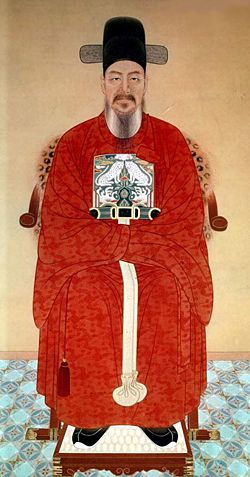Yi Sunshin: Difference between revisions
imported>Chunbum Park |
imported>Chunbum Park |
||
| Line 8: | Line 8: | ||
Yi Sunshin was born on April 28, 1545 in the ''Geoncheon-dong'' area of [[Seoul]]. Yi was the third of the four sons begot by Yi Jeong (<span style="font-family: Batang, Serif">이정</span>:李貞) and Chogyae Byeonssi (<span style="font-family: Batang, Serif">초계변씨</span>:草溪卞氏)<ref name="note">'''Note:''' Korean women keep their last name upon marriage</ref>. Despite their aristocratic ''yangban'' lineage, the family lived a modest life, since Yi's father opted to avoid the promising path of a [[Joseon Dynasty]] [[national civil service|scholar official]]. The reason for this withdrawal of ambitions was Jeong's bitter memory of a violent political purge 20 years before, in which many government officials were killed, and many others, including Sunshin's grandfather Yi Baek-rok (<span style="font-family: Batang, Serif">이백록</span>:李百祿), were demoted to the lower ranks.<ref name="baekrok">[http://www.yisunshinusa.com/images/pdf/article_jomyung_2.pdf 선비가문, 지혜에 담력 갖춘 지장: 이순신과 임진왜란의 재조명] by Yi Naewon, ''Washington Hangook Ilbo'', 2003-04-29, date accessed: 2008-07-27</ref><ref name="gimyo">[http://enc.daum.net/dic100/contents.do?query1=b03g0904a 기묘사화 (己卯士禍)], Korea ''Britannica Encyclopedia'', Daum.net, date accessed: 2008-07-27</ref> | Yi Sunshin was born on April 28, 1545 in the ''Geoncheon-dong'' area of [[Seoul]]. Yi was the third of the four sons begot by Yi Jeong (<span style="font-family: Batang, Serif">이정</span>:李貞) and Chogyae Byeonssi (<span style="font-family: Batang, Serif">초계변씨</span>:草溪卞氏)<ref name="note">'''Note:''' Korean women keep their last name upon marriage</ref>. Despite their aristocratic ''yangban'' lineage, the family lived a modest life, since Yi's father opted to avoid the promising path of a [[Joseon Dynasty]] [[national civil service|scholar official]]. The reason for this withdrawal of ambitions was Jeong's bitter memory of a violent political purge 20 years before, in which many government officials were killed, and many others, including Sunshin's grandfather Yi Baek-rok (<span style="font-family: Batang, Serif">이백록</span>:李百祿), were demoted to the lower ranks.<ref name="baekrok">[http://www.yisunshinusa.com/images/pdf/article_jomyung_2.pdf 선비가문, 지혜에 담력 갖춘 지장: 이순신과 임진왜란의 재조명] by Yi Naewon, ''Washington Hangook Ilbo'', 2003-04-29, date accessed: 2008-07-27</ref><ref name="gimyo">[http://enc.daum.net/dic100/contents.do?query1=b03g0904a 기묘사화 (己卯士禍)], Korea ''Britannica Encyclopedia'', Daum.net, date accessed: 2008-07-27</ref> | ||
When Chogyae Byeonssi was pregnant with her third child, Yi Baek-rok appeared to her in a dream and told her, "that child will turn out to be extraordinary, so name him 'Sunshin'."<ref name="e life 2">[http://www.e-sunsin.com/e-sunshin/life/life_02.jsp 이순신의 탄생과, 그 무렵의 국내 정세], ''성웅 이순신'' project, Asan municipal government. date accessed: 2008-07-27.</ref> | When Chogyae Byeonssi was pregnant with her third child, Yi Baek-rok appeared to her in a dream and told her, "that child will turn out to be extraordinary, so name him 'Sunshin'."<ref name="e life 2">[http://www.e-sunsin.com/e-sunshin/life/life_02.jsp 이순신의 탄생과, 그 무렵의 국내 정세], ''성웅 이순신'' project, Asan municipal government. date accessed: 2008-07-27.</ref> Thus, like his brothers, Yi was named a "vassal" (''shin'') of one of the sage kings of ancient China (in this case, ''Shun'').<ref name="hawley118-122">Hawley, 2005. pp. 118-122.</ref> | ||
A survey conducted by Sooncheonhyang University in 2005 indicated that Koreans generally regard Yi Sunshin to be the greatest figure in Korean history.<ref name="greatest">[http://english.chosun.com/w21data/html/news/200504/200504150030.html Citizens Name Admiral Yi 'Greatest Korean'], ''Chosun Ilbo'', 2005-04-15, date-accessed: 2008-07-24</ref> | A survey conducted by Sooncheonhyang University in 2005 indicated that Koreans generally regard Yi Sunshin to be the greatest figure in Korean history.<ref name="greatest">[http://english.chosun.com/w21data/html/news/200504/200504150030.html Citizens Name Admiral Yi 'Greatest Korean'], ''Chosun Ilbo'', 2005-04-15, date-accessed: 2008-07-24</ref> | ||
Revision as of 23:16, 27 July 2008
Yi Sunshin (이순신:李舜臣, April 28, 1545 – December 16, 1598) was a Korean admiral renowned for his naval victories against the invading Japanese during the Korean War of 1592-1598.
Family & early life
Yi Sunshin was born on April 28, 1545 in the Geoncheon-dong area of Seoul. Yi was the third of the four sons begot by Yi Jeong (이정:李貞) and Chogyae Byeonssi (초계변씨:草溪卞氏)[1]. Despite their aristocratic yangban lineage, the family lived a modest life, since Yi's father opted to avoid the promising path of a Joseon Dynasty scholar official. The reason for this withdrawal of ambitions was Jeong's bitter memory of a violent political purge 20 years before, in which many government officials were killed, and many others, including Sunshin's grandfather Yi Baek-rok (이백록:李百祿), were demoted to the lower ranks.[2][3]
When Chogyae Byeonssi was pregnant with her third child, Yi Baek-rok appeared to her in a dream and told her, "that child will turn out to be extraordinary, so name him 'Sunshin'."[4] Thus, like his brothers, Yi was named a "vassal" (shin) of one of the sage kings of ancient China (in this case, Shun).[5]
A survey conducted by Sooncheonhyang University in 2005 indicated that Koreans generally regard Yi Sunshin to be the greatest figure in Korean history.[6]
notes
- ↑ Note: Korean women keep their last name upon marriage
- ↑ 선비가문, 지혜에 담력 갖춘 지장: 이순신과 임진왜란의 재조명 by Yi Naewon, Washington Hangook Ilbo, 2003-04-29, date accessed: 2008-07-27
- ↑ 기묘사화 (己卯士禍), Korea Britannica Encyclopedia, Daum.net, date accessed: 2008-07-27
- ↑ 이순신의 탄생과, 그 무렵의 국내 정세, 성웅 이순신 project, Asan municipal government. date accessed: 2008-07-27.
- ↑ Hawley, 2005. pp. 118-122.
- ↑ Citizens Name Admiral Yi 'Greatest Korean', Chosun Ilbo, 2005-04-15, date-accessed: 2008-07-24
